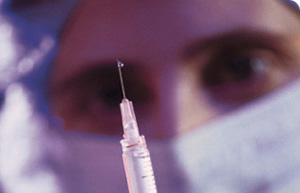
|
 |
 |
 Health & Beauty | January 2008 Health & Beauty | January 2008  
Researchers Work On Cocaine Vaccine
 Associated Press Associated Press
go to original


| | Approval would mark a breakthrough in the treatment of cocaine addiction, which now mostly involves psychiatric counseling and 12-step programs. |
Two Baylor College of Medicine researchers in Houston are working on a cocaine vaccine they hope will become the first-ever medication to treat people hooked on the drug. "For people who have a desire to stop using, the vaccine should be very useful," said Dr. Tom Kosten, a psychiatry professor who is being assisted in the research by his wife, Therese, a psychologist and neuroscientist. "At some point, most users will give in to temptation and relapse, but those for whom the vaccine is effective won't get high and will lose interest."

The vaccine, currently in clinical trials, stimulates the immune system to attack the real thing when it's taken.

The immune system — unable to recognize cocaine and other drug molecules because they are so small — can't make antibodies to attack them.

To help the immune system distinguish the drug, Kosten attached inactivated cocaine to the outside of inactivated cholera proteins.

In response, the immune system not only makes antibodies to the combination, which is harmless, but also recognizes the potent naked drug when it's ingested. The antibodies bind to the cocaine and prevent it from reaching the brain, where it normally would generate the highs that are so addictive.

"It's a very clever idea," says David Eagleman, a Baylor neuroscientist. "Scientists have spent the last few decades figuring out reward pathways in the brain and how drugs like cocaine hijack the system. It turns out those pathways are difficult to rewire once they've seen the drug. But the vaccine just circumvents all that."

Kosten asked the Food and Drug Administration in December to green-light a multi-institutional trial to begin in the spring and is awaiting a response.

Approval would mark a breakthrough in the treatment of cocaine addiction, which now mostly involves psychiatric counseling and 12-step programs. It presumably would be the final clinical hurdle before the vaccine — more than a decade in the making — might be approved for treatment. But one expert warns against expecting too much.

"Addiction vaccines are a promising advance, but it's unlikely any treatment in this field will work for everyone," said Dr. David Gorelick, a senior investigator at the National Institute on Drug Abuse. "Still, if they prove successful, they will give those working in drug addiction an important option." | 
 | |
 |



